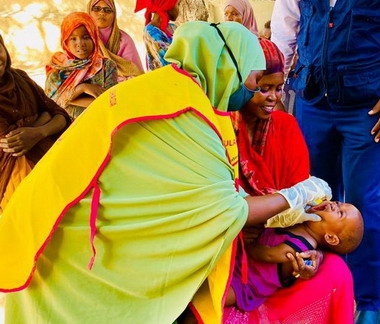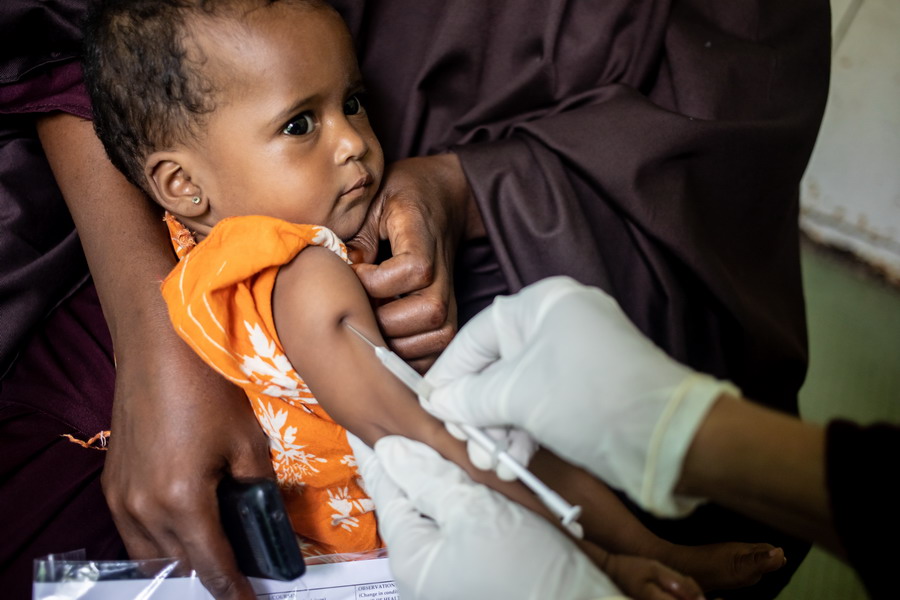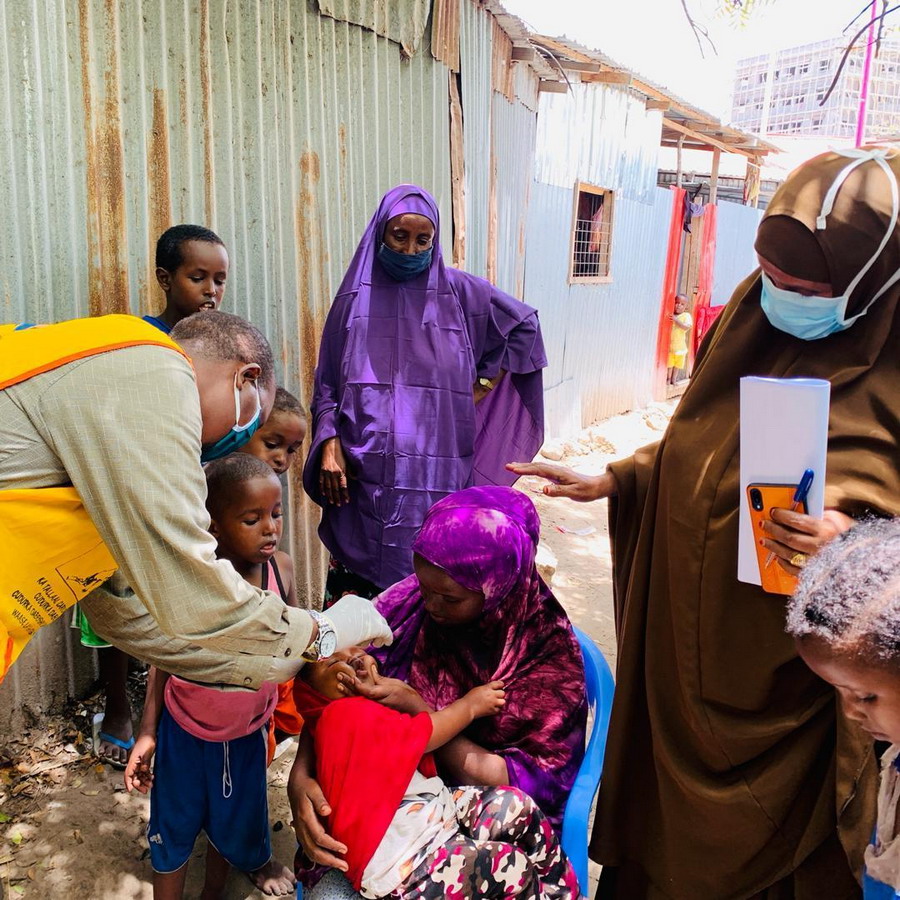
30 August 2020 – For 3 days during a blazing Mogadishu summer, across 17 of Banadir’s districts, around 2500 women and 790 men pulled on their masks and sat cautiously at a safe distance from each other to undergo refresher training. They were preparing for no ordinary feat – conducting a health campaign that will see them offering around 400 000 children aged under 5 measles and polio vaccines, and vitamin A and deworming tablets at fixed and outreach sites, all amid a COVID-19 pandemic.
Even though the trainees have years of experience in planning and conducting immunization campaigns, some are a little anxious about how Somali families will react to them trying to offer health services during an ongoing pandemic of a highly contagious disease. Throughout the campaign, which started on 30 August and will run until 1 September, health workers will observe comprehensive COVID-19 infection prevention measures, such as regular handwashing and wearing face masks, to keep families safe. In addition, health workers will share information with families on how to prevent the further spread of COVID-19.
“I hope that caregivers and parents see that our teams have all been trained and retrained to consider the health safety measures of families above all,” says Mohamed Shire, Polio Eradication Officer for the central region of Somalia. “While ensuring families’ and our own safety, we will conduct our duties to protect every Somali child from diseases.”
Vaccinating children against 2 diseases or more at one time is a common practice across much of the world. Health workers understand that parents have a lot to deal with, and that vaccination often gets pushed aside by work, household tasks and childcare. The inclusion of other health interventions in polio campaigns, such as measles vaccine, vitamin A tablets or deworming pills, is a safe and easy way to help parents give their children the best possible protection against childhood diseases.
Impact of COVID-19 on routine immunization coverage of life-saving vaccines
Across the globe, while the highly transmissible disease and community spread seems to be continuing, the COVID-19 virus has also taken a swing at both the delivery of health services, and health-seeking behaviour. In Somalia, health facilities have recorded a drop in caregivers’ visits to have their children immunized since March this year, when the first case of COVID-19 was confirmed in Mogadishu. When comparing overall vaccination coverage for the first half of last year with the same period this year, health facilities noted that pentavalent 1 coverage dropped by 11%, pentavalent 3 coverage reduced by 7% and measles 1 coverage dropped by 3%.

The pandemic also meant health workers ‘paused’ other regular, planned activities, such as the integrated polio-measles campaign, as they worked to prevent the spread of COVID-19 and provide much needed treatment for infected people.
Dr Asma Ali, acting Head of WHO’s Polio Programme in Somalia, is relieved to be resuming health activities in Somalia again.
“This campaign in Banadir was supposed to take place in November last year, following a similar intervention in the rest of the country, but was postponed to 2020 due to some technical delays. Unfortunately, COVID-19 came about and took over. Thankfully, we now have a chance to continue to boost the immunity of so many young children again,” Dr Asma explained.
A hub for Somalis and a hotspot for the spread of diseases
Since the start of the year, 744 children in Banadir have reportedly been infected with measles, which accounts for around half the total number of cases in the country. This highly contagious infectious disease can cause a fever and rash among other symptoms in unvaccinated children.
Home to the largest number of displaced people in Somalia, and a hub for Somalis travelling internationally, Banadir also confirmed cases of 3 children with a rare strain of poliovirus that can be found in pockets of children with low immunity.
Two forms of polioviruses, in circulation in Somalia since the end of 2017, have caused paralysis in 19 children so far across the country.
Protecting children from preventable diseases
Dr Mamunur Malik, WHO Somalia Representative, emphasized to Somali communities that every adult has a responsibility to help Somali children lead healthy lives.
“I would like to encourage parents, caregivers and all adults in Banadir and surrounding areas to make the most of this opportunity and visit vaccination sites to ensure every child under 5 is vaccinated against polio and measles, and that every child receives additional supplements to keep them healthy. As caregivers we all have an obligation to ensure our children lead healthy and productive lives,” said Dr Malik.

“As the COVID-19 response continues, it is critical that immunization drives are sustained at the same time,” added Penelope Campbell, Chief of Health, UNICEF Somalia. “Measles and polio are vaccine-preventable diseases and through this campaign, we can stop the further spread of these outbreaks and save the lives of countless children.”
More than 1200 teams with skilled personnel will be offering vaccinations against measles and polio, and supplements to children at fixed sites in Banadir during the 3-day campaign. In addition, social mobilizers from target communities will be spreading messages on the benefits of vaccination and supplements.
The successful completion of the current mass immunization campaign against measles and polio in the midst of an ongoing pandemic in Somalia will not only protect an estimated 400 000 Somali children against vaccine-preventable diseases, the campaign will also focus on the importance of resuming essential health care services, like routine immunization activities in fragile settings using standard health safety measures. The campaign will also give a signal to all health partners that despite challenges of maintaining physical distancing, with the use of masks and other measures in health facilities and vaccination sites, it is practically possible to organize such mass campaigns and other routine health services through effective planning, coordination and implementation of appropriate risk mitigation measures addressed at individual and population levels.
Note to editors
The integrated measles and polio campaign in Banadir is being conducted by Somali health authorities, with technical support from WHO, UNICEF and other Global Polio Eradication Initiative (GPEI) partners, and national and international partners, including Gavi, the Vaccine Alliance.




